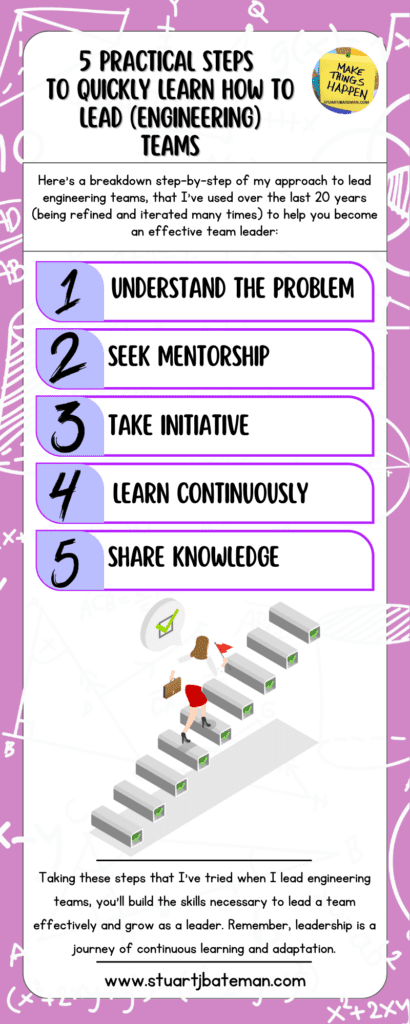How can I quickly learn to lead engineering teams more effectively?
The control of a large force is the same principle as the control of a few men, it is merely a question of dividing up their numbers – Art of war

How to lead engineering teams
To quickly learn how to lead engineering team effectively, start by gaining a thorough understanding of the project or problem you’re working on. Having a solid plan to solve it is crucial, but remember to involve your team members—everyone’s ideas can enhance the plan and make it more robust.

Here’s a breakdown step-by-step of my approach to lead engineering teams, that I’ve used over the last 20 years (being refined and iterated many times) to help you become an effective team leader:
- Understand the Problem:
- Define the problem clearly and determine its scope. Break down the project into manageable tasks, estimate the time each task might take, and identify the resources you need. While you don’t have to be an expert in every aspect, having a solid technical foundation is essential. This will allow you to communicate effectively with your team and explain solutions to stakeholders in layman’s terms.
- Tool: Fishbone / Ishikawa diagram
- Book/Site: Citoolkit.com
- Method: 5Y/ Critical thinking / A3
- Define the problem clearly and determine its scope. Break down the project into manageable tasks, estimate the time each task might take, and identify the resources you need. While you don’t have to be an expert in every aspect, having a solid technical foundation is essential. This will allow you to communicate effectively with your team and explain solutions to stakeholders in layman’s terms.
- Seek Mentorship:
- Consider shadowing an experienced team leader or taking on a simpler project initially. By observing and learning from a mentor, you can ask questions about their decision-making processes and understand how they allocate resources and prioritize tasks.
- Take Initiative:
- Once you’re comfortable, ask your mentor if you can lead a small group within the team to tackle a specific task. Make decisions, explain your reasoning, and seek feedback from your mentor to refine your approach.
- Books: Austin Kleon‘s books these are great to inspire people into taking action!
- Once you’re comfortable, ask your mentor if you can lead a small group within the team to tackle a specific task. Make decisions, explain your reasoning, and seek feedback from your mentor to refine your approach.
- Learn Continuously:
- A great resource to consider is John Shook’s book on the A3 management process “Managing to learn”. In the book, the narrative follows a mentor (Sensei) and a learner. The learner is given a project to manage, guided by the Sensei, who helps them think critically about their decisions. The learner continuously updates the A3 document with new insights, eventually preparing it for a team to take over while they move on to the next project. This method highlights the importance of iterative learning and reflection.
- Book: Managing to learn, Learning how to learn, Thinking fast & Slow
- Sites: Brilliant.org (their logic course is great for leadership)
- Method: FOG (my blog here covers this method)
- Test what you have learnt to adapt it to your needs.
- A great resource to consider is John Shook’s book on the A3 management process “Managing to learn”. In the book, the narrative follows a mentor (Sensei) and a learner. The learner is given a project to manage, guided by the Sensei, who helps them think critically about their decisions. The learner continuously updates the A3 document with new insights, eventually preparing it for a team to take over while they move on to the next project. This method highlights the importance of iterative learning and reflection.
- Share Knowledge:
- Finally, teach others what you know. This helps reinforce your understanding and identifies gaps in your knowledge. Developing a training program for others will not only solidify your learning but also enhance the skills of those around you.
- Sites: Governing, STEM ambassadors
- Or teach within your business!
- Finally, teach others what you know. This helps reinforce your understanding and identifies gaps in your knowledge. Developing a training program for others will not only solidify your learning but also enhance the skills of those around you.
Taking these steps that I’ve tried when I lead engineering teams, you’ll build the skills necessary to lead a team effectively and grow as a leader. Remember, leadership is a journey of continuous learning and adaptation.



What are your thoughts? Have I covered everything or is there more you know and would like to share?
I’m always learning and improving this site and my blogs, so please feel free to get in touch with me via LinkedIn or this site to discuss any topics I have covered.
If you’re having trouble finding ways to progress check out these sites filled with free learning tools:


Discover more from The Chartered Engineer
Subscribe to get the latest posts sent to your email.